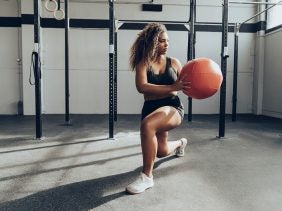How Do You Know If You’re In A Sporting Rut?
 ©alvarez
©alvarez
You’ve tried everything. You’ve made changes to your training routines. You’ve changed things in your diet. You’ve changed your kit, you’ve got the latest sneakers, and some new leggings from your favorite brand. But all in vain. Your goals and performance haven’t improved for weeks. What’s going on? You may be experiencing sports stagnation (also known as a plateau) that’s causing your athletic performance to fall short of expectations. But no need to panic: this won’t last forever. Don’t blame yourself either because there are many external factors that may be affecting your goals. Plus, you can beat this plateau. We’ll tell you how.
What is the plateau effect?
Wu Xiangming, an expert in sports analysis from Chengdu Sport University, explains that “the plateau effect is a phenomenon that refers to stagnation or even a setback suffered by an athlete within a certain period of time after progress in training.” It’s a period of time during which “the athlete’s potential is not fully developed.”

5 ideas to avoid performance stagnation
You can also try some tips that can help you get through this difficult time. Here are some ideas to help you get back to feeling good while you train and improve on your own personal bests. That’s why we’ve put together 5 tips to beat the dreaded plateau effect.
#1 Redefine objectives: Our objectives must be clear and, above all, realistic. Maybe you’ve spent too much time aiming for a goal or a benchmark in your training that you just can’t reach. It may be a good time to redefine your goals. You can make use of different mental strategies that many athletes use to work on their motivation. The WOOP method, for example, is a really handy tool for setting preferences and changing our habits. The WOOP method is a mental strategy based on more than twenty years of scientific research on human motivation that people can use to find and fulfill their desires, set preferences and make changes to their habits.
#2 Rest: A good rest is as important as a good workout. You’ve probably heard this many times before, but do you sleep long enough and well enough? Multiple studies have shown that a lack of sleep decreases the activity of protein synthesis pathways and increases the activity of degradation pathways. This means that you lose muscle mass and don’t recover as well after exercise. Also, if you don’t sleep well, you’re more at risk of injury. You can take some supplements to help you sleep better, such as melatonin or lemon balm. You can also read our guide to better sleep. What you have to be clear about is that your body needs to get enough rest if you want to be able to give it your all when it comes to training.
#3 Beware of overtraining: Do you sleep well? Are you tired all day? Do you get irritable and in a bad mood? They may be symptoms of overtraining. If you train very often and very intensively, you should watch out for these kinds of problems, which are a sign that you may be training too hard. Motivation to train is positive but can backfire in the form of injuries and a lack of energy.
#4 Sports nutrition is key: The world of sports nutrition is growing and improving every day. It helps to promote both muscle development and cardiovascular endurance, while also minimizing fat accumulation. A good diet is key, as is knowing how to use sports supplementation. Whey protein,amino acids, creatine… But it is true that making your own nutritional plan can end up being frustrating, as well as impractical due to the amount of knowledge required. It might be a good idea to hire a professional to help you create a nutritional plan tailored to your workouts to get the maximum benefit.
Find out more about this topic at foodspring:
- How to Use the WOOP Method to Accomplish Your Goals
- Optimize Your Workout Recovery with this Mobility and Stretching Routine
- Why active recovery matters: Get moving on your rest days!
Sources for this article
We at foodspring use only high-quality sources, including peer-reviewed studies, to support the facts within our articles. Read our editorial policy to learn more about how we fact-check and keep our content accurate, reliable, and trustworthy.





























